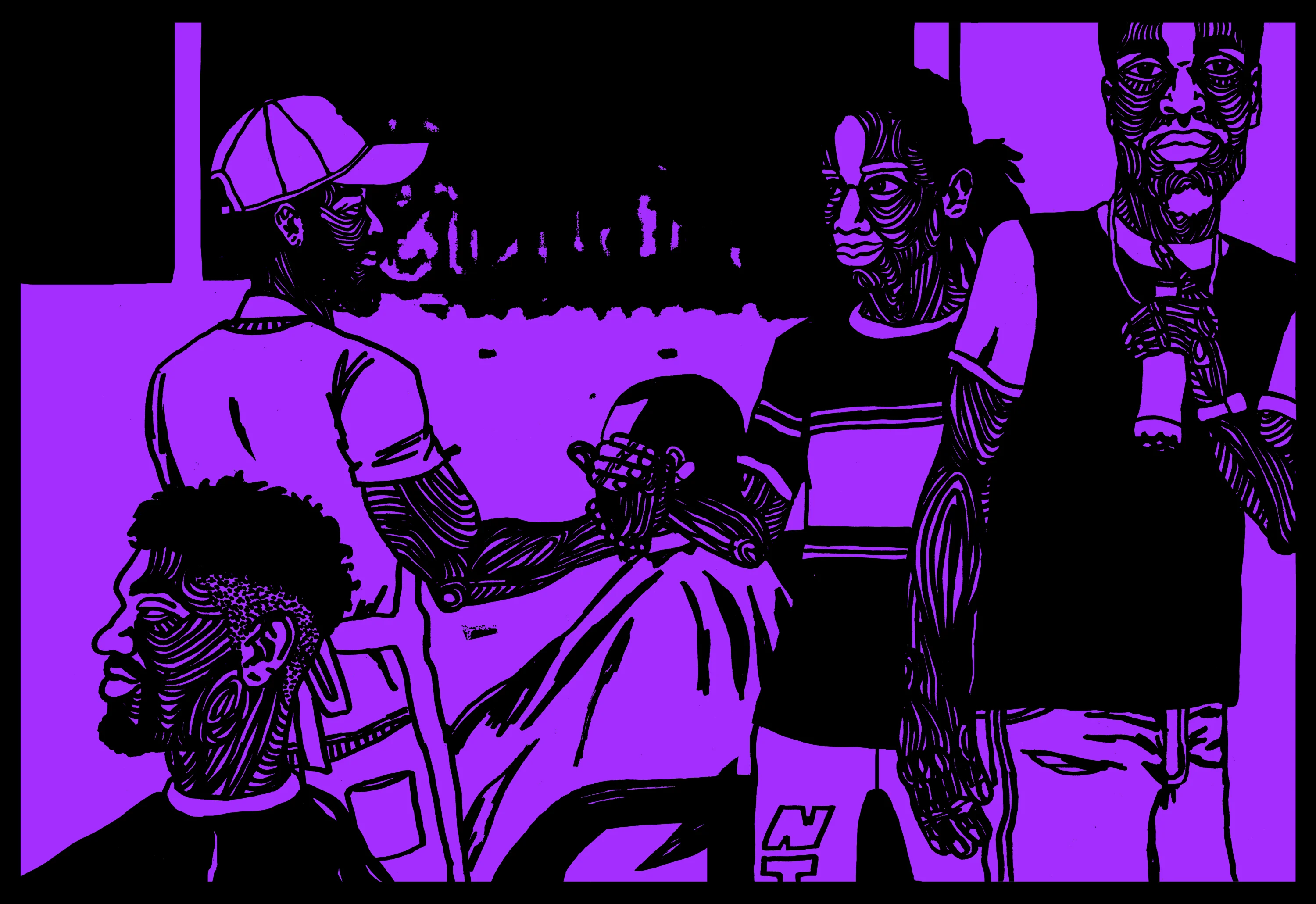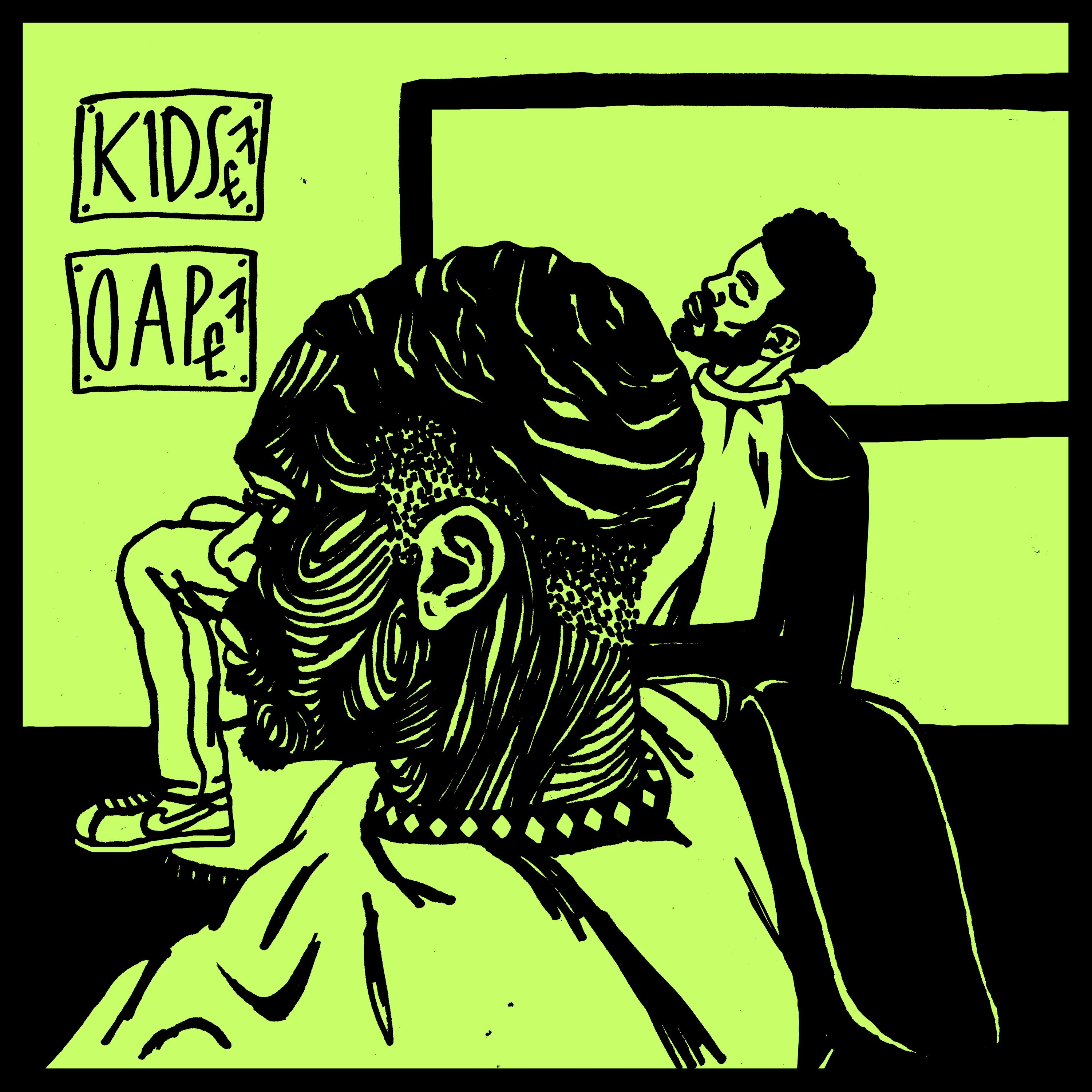
The barbershop has been long-regarded as sacred ground among Black men. The shops find us at our most vulnerable. When beards are overgrown and shape-ups have long faded, we flock to these institutions to, in some ways, be born anew. Writer Aniefiok Ekpoudom explores how, for Black British men, the podcast is fast becoming the place in which the most important types of conversations are had.
Illustrations by Olivia Twist.
I have been making the trip back-and-forth to my local barber for more than a decade now, have navigated through from my early teens into my late twenties with his shop as one of my only constants fixtures. During these years I have come to realise that my barbershop, like many across the UK, is about more than grooming. It is a hallowed watering hole wedged in on a cluttered city high street, a communal space where debates about football rage into early evening, new music is discovered on old stereos and customers receive relationship counseling while metal clippers comb through the kinks in our hair.
But in an era where physical connection is ever diminishing and fresh forms of digital intimacy continue to bloom in its place, the bonding experience of the barbershop has, in many ways, been supplemented by the podcast. As we float through our days with headphones in our ears, these free-ranging platforms, which hold honest, open-conversation as their high-water mark, spark memories of waiting out haircuts on Saturday afternoons.

As of 2018, Apple reported that were over 550,000 podcasts, with 18.5 million episodes between them with shows like The Joe Rogan Experience, Serial and The Shrink Next Door ranking among the most popular. In the UK alone, nearly six million adults tune into a podcast each week. State-side, popular shows like The Brilliant Idiots and The Joe Budden Podcast often tap into conversations happening in African American communities. But here, in the UK, only a handful of shows cast their gaze over the Black British male experience.
Among these podcasts is Halfcast, a weekly podcast hosted by Chuckie, a DJ and presenter from west London, and north London entertainment/football personality Poet, alongside a revolving roster of guest hosts (like their producer Savage Dan), and one-off interviews. Poet and Chuckie met early on in their careers in the underground circuit of the UK Music industry. They stayed in touch and eventually reconnected properly when Chuckie wanted to add something more permanent to the interviews he had been weaving into his radio shows. They decided on a podcast, and though it often tends to swing towards discussions about music – specifically Black British genres like grime, UK rap and everything in between – it encompasses much more.
Together, the pair strike a unique balance, with Chuckie steering the show, renavigating them through topics, while Poet bleeds an unfettered honesty into every discussion they enter. In the 200 or so episodes I have listened to, the hosts play both the counsellor and counselled, comedian and relationship expert, career advisor and football pundit, deftly oscillating among the variety of touchpoints that scatter the spectrum of the Black British male experience.
“My whole thing has always been medicine in candy,” Chuckie says. “You might listen to the podcast and we might be talking the most outrageous foolishness, but then you’ll come back next week and I’ll have the Urban Financier on and we’ll talk about money and credit. It’s my way of getting people’s ear by catching joke, and then I’ll hit you with something that might be a little more meaningful.”
In an episode of the podcast titled 12 Things Men Fear But Never Talk About? Chuckie and Poet have a conversation sparked by a YouTube video of a similar title, in which publishing channel BRIGHT SIDE, which sets out to “answer life’s biggest questions” present 12 silent fears that men secretly obsess over but never speak about. When Halfcast tackled the topic, the hosts dissected every touchpoint, fear-by-fear, interpreting each through their own personal lens and experience.
“The beauty of doing a podcast like this,” Chuckie says, “is being honest enough to show your flaws. Being able to be like; ‘you know what, I handled a situation in this way and it wasn’t the best way to do it.’”

Throughout the episode we hear them open up on financial insecurities and physical appearance, the open expression of emotions and dealing with the obstacles that come with relationships. Unintentionally it became an exploration of the pressures that face many young men as they navigate the world, and represents the increasing willingness among men in recent times to speak openly on the stresses that punctuate our lives.
“I’m not out here trying to be a spokesperson for men,” Chuckie says. “I’m just being true to myself, true to my experiences, spending a lot of time unlearning my previous thought processes and then talking about it. If that resonates with some people that’s good, if it doesn’t then that’s fine too.”
Many podcasts present similar themes, but by predominantly speaking from the perspective of Black men, and sandwiching these conversations among more light-hearted talk, Halfcast are operating on fairly untouched ground. In hearing them speak aloud, it gives power to the sentiments that we are not isolated in our experience, and that we are all navigating the hurdles life throws at us. It has become a meeting spot for the kind of conversation that many men have been keeping behind closed doors; the kind that Black men occasionally delve into in barber shops across Britain. The quiet fears that gnaw away at the mind and the anxieties left unspoken.
“Sometimes I think I might say too much about myself,” Chuckie says. “But it works for me. Sometimes it’s like therapy. I just sit there talking to my friends, or to someone I respect and I’m just saying how I feel. Then I leave there and I feel lighter.”
But not all of their conversations dial into such vulnerable topics. In a pure reflection of daily life and friendship there is laughter that brings tears, impassioned debates about music and light-hearted dissections of pop culture. It is one of the few podcasts where many Black men like myself see our array of interests given a platform. The music they speak of is the music I stream, the films they reference are the same films I also treasure. In all, it reminds me of the freeing bonds that exist among my closest male friends and the liberating nature of the barbershop. Perhaps unintentionally, Halfcast has become a space for freedom and relief, where black men like myself can show up to be heard and understood, to gain nuggets of wisdom and to receive perspective from those whose experiences resemble mine.
They are not alone in this dynamic. The #3ShotsOfTequila podcast, hosted by friends Marvin Abbey, Keith Dube and Tazer Black, occupies a similar space. Their aim is to bring the dynamic of the WhatsApp group to life so, when they sit down together every week, they dive into conversation that is wide-spanning, talking on everything from music to family, sex to politics. Their life experiences are laced into episodes that can sometimes last as long as three hours.

The trio tape in the late evenings and begin every episode by simply updating listeners on their lives. Usually, one of these experiences sparks a wider conversation and from there, the episode unfolds. What follows is care-free, flowing conversation. In one episode, during the span of no more than an hour, they fiercely debate natural medicines and conspiracy theories, banter about who has the weakest immune system, tell old stories about visits to sexual health clinics and then have an impassioned discussion about unexpected fatherhood.
“That’s how our conversations go in the group chat,” Tazer tells me, who often plays devil’s advocate in order to open up the conversation further. “You can be talking about something serious, then someone throws in a funny video or a picture and then it changes. It’s literally carefree. It’s not ‘this is the podcast about politics.’ We might talk about politics for 20 minutes, then we might talk about sex.”
There is an easiness to the way in which the episodes unfold, and as they dance among topics, they endear themselves to the legions of listeners who, like them, share Twitter posts in group chats and then debate them fiercely. On YouTube they have accumulated over 2 million views, and according to their website, over 10,000,000 listens across all platforms.
Many Black men have come to see themselves in these podcasts, even look up to the hosts who are carving out careers from the kind of conversations they carry behind closed doors.
“It’s relatable,” Tazer says. “I’m here, I’m not someone on TV or in America, I’m literally someone who could be your next-door neighbor.”
“I feel like I’ve been through so many things and I’m still here. Living in London is not easy, and we were pretty sure there were people out there going through the same thing. We’re all from different areas of London and going through similar experiences, so we knew there must be someone out there who can relate. We packaged it in a candid way, gave it out and that’s where we are today.”
According to a quarterly Acast Audio Intelligence Report from 2018, the publishers average listening hours per person in the UK were at an average of 3.6 hours per week, more time than many of us can afford with our friends and families. They shadow us through our days, enliven long hours sat at office desks, give flavour to tiring commutes. This breeds an intimacy between listener and host. For hours every week, we engage in one-way conversation with these strangers who have, in a way, become our friends.

It’s a bond that #3ShotsOfTequila feel the impact of. What has formed in the podcast’s aftermath is an active community of supporters who resonate with the hosts. Hours after releasing each episode, listeners wade in with their opinions on Twitter via the hashtag. Some fans message one another and arrange to attend the live shows together, sometimes without even having met before. Some fans message Tazer and the boys asking for advice or seeking perspective on the dilemmas plaguing their own lives, enquiring about everything from navigating university and careers, to dealing with relationships. “It’s overwhelming sometimes. I’m just me, I’m not trying to a role model or anything like that. If I can’t give you advice I won’t because I’m not qualified in that sense, but if it’s lighter stuff, then okay.”
Stories like Tazer’s nod to the powerful role open dialogue plays in our lives. On this fast-unfolding audio frontier, these podcasts have carved out a space for Black men like myself to laugh and to listen, to be vulnerable and to feel heard.
The barbershop still retains its sacred status and will always be revered for the communal discussions that unfold while afros are fashioned into skin fades. But I welcome my new companions also, the podcasts that are with me during long commutes and long-days sending emails by my laptop. They are the mood on the ground, the chatter in the streets. If ever I find myself abroad or away from home for long stretches, podcasts like these keep me dialled in. They bring laughter to my life and on difficult days, remind me, and other young men, that our experiences aren’t being lived out in isolation, that there are others like me, who are hudling the same obstacle and dealing with the same pressures. They are digital pieces of home that keep me rooted. They are connections to my community that I can carry in my pocket wherever I go.